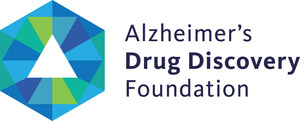Alzheimer's Drug Discovery Foundation's Diagnostics Accelerator Provides Bold Vision for Developing Biomarkers for Every Alzheimer's Drug Target
Biomarkers--catalysts for critical improvements in disease diagnosis and clinical trials--are focus of new report that details their essential role in a robust Alzheimer's research pipeline
NEW YORK, Aug. 13, 2021 /PRNewswire/ -- The Alzheimer's Drug Discovery Foundation's (ADDF) Diagnostics Accelerator (DxA) issued a report today detailing its work to accelerate the validation of new biomarkers—non-invasive and affordable methods for diagnosing Alzheimer's earlier than ever before, including before symptoms begin.
Biomarkers are also essential to developing new Alzheimer's drugs because they help researchers enroll the right patients in clinical trials and track their progress. Biomarkers are used in most of the phase 2 and 3 clinical trials in today's robust and diverse clinical trial pipeline. The Amyvid® PET scan, a biomarker that was developed with early funding from the ADDF, was a critical component of the phase 3 trials that led to approval of Aduhelm™, the first new Alzheimer's drug in 17 years. The U.S. FDA approved Aduhelm based on biomarker data from patient scans showing rapid clearance of amyloid plaques from patients' brains. Two other drugs that received FDA breakthrough designation in June—lecanemab (Eisai and Biogen) and donanemab (Eli Lilly)—also used the Amyvid PET scan work to measure reductions in amyloid deposits in the brain.
"Biomarkers are important for not just one drug, but a diverse armament of drugs that can be combined for personalized medicine—the future of managing Alzheimer's," said Howard Fillit, M.D., Founding Executive Director and Chief Science Officer of the Alzheimer's Drug Discovery Foundation, a nonprofit that currently supports over 30 active clinical trials, one of the largest Alzheimer's portfolios worldwide. "We are focused on investing in drug targets and biomarkers that reflect the many biological pathways involved in neurodegenerative dementias, including inflammation, misfolded proteins, and other mechanisms affected by aging that may contribute to this complex disease."
The DxA is a collaborative research initiative funded by leading philanthropists including ADDF Co-Founder Leonard A. Lauder, Bill Gates, Jeff Bezos, MacKenzie Scott, the Dolby family, the Charles and Helen Schwab Foundation, and The Association for Frontotemporal Degeneration, among others, to fast-track the development of affordable and accessible diagnostic tools and biomarkers for Alzheimer's disease and related dementias.
"The ADDF's Diagnostics Accelerator has a bold vision of a day in the near future when several blood tests, eye scans and even digital monitoring can tell us for sure who has Alzheimer's just as easily as we can tell who has high cholesterol, diabetes or an infection," said Niranjan Bose, Ph.D., Managing Director, Health & Life Sciences at Gates Ventures. "The DxA is looking at possible tools for early detection of Alzheimer's that may help patients take preventive steps years before symptoms are detected."
The DxA is born out of the ADDF's long-standing commitment to investing in a wide range of biomarkers to speed the discovery of drugs to treat, prevent and cure Alzheimer's.
Strategic, business focused investments foster bold ideas, attract additional funders
The principles guiding DxA funding are aligned with the ADDF's venture philanthropy approach, which combines scientific and business acumen to seek out, assess and fund high-risk, high-reward research programs. The thorough due diligence process that underpins DxA investments not only helps fund programs with a high likelihood of succeeding, but it can also bolster important investment decisions from others.
Since its 2018 launch, the Diagnostics Accelerator has made up to $38 million in investments in over 30 research programs worldwide. Many of these programs have leveraged DxA support to generate the data needed to secure additional venture capital, large commercial investors, funding from the National Institute of Aging and new partnerships with biotechnology and pharmaceutical companies.
High-quality research sought and funded on an ongoing basis
The DxA encourages researchers from academia and biotechnology companies to learn more about DxA funding priorities and submission of proposals. The DxA encourages submission of applications for blood and other peripheral markers, including saliva and urine. DxA also encourages applications for research into digital markers using a variety of technologies, including wearable devices, mobile and table apps, smart home systems, virtual and augmented reality platforms, and desktop and web apps.
"The first critical step in finding drugs to prevent, treat and cure Alzheimer's is being able to diagnose patients," said Dr. Fillit. "In the short term, this will help us get the right people enrolled in clinical trials. But these same tests will eventually be a powerful tool in helping physicians provide precision treatments to Alzheimer's patients."
About the Alzheimer's Drug Discovery Foundation
Founded in 1998 by Leonard A. and Ronald S. Lauder, the Alzheimer's Drug Discovery Foundation is dedicated to rapidly accelerating the discovery of drugs to prevent, treat and cure Alzheimer's disease. The ADDF is the only public charity solely focused on funding the development of drugs for Alzheimer's, employing a venture philanthropy model to support research in academia and the biotech industry. Through the generosity of its donors, the ADDF has awarded more than $168 million to fund over 650 Alzheimer's drug discovery and biomarker programs and clinical trials in 19 countries. To learn more, please visit: http://www.alzdiscovery.org/.
The Diagnostics Accelerator research initiative is dedicated to accelerating the development of affordable and accessible biomarkers to diagnose Alzheimer's disease and related dementias and advance the clinical development of more targeted treatments. Through translational research awards and access to consulting support from industry experts, this program will challenge, assist, and fund the research community in both academia and industry to develop novel peripheral and digital biomarkers.
SOURCE Alzheimer's Drug Discovery Foundation

Related Links
WANT YOUR COMPANY'S NEWS FEATURED ON PRNEWSWIRE.COM?
Newsrooms &
Influencers
Digital Media
Outlets
Journalists
Opted In






Share this article